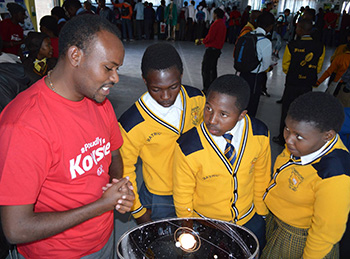Latest News Archive
Please select Category, Year, and then Month to display items
12 October 2020
|
Story Arina Engelbrecht
|
Photo Supplied
 Arina Engelbrecht from Organisational Development and Employee Well-being believes physical activity has a number of benefits for one’s health, including stress relief.
Arina Engelbrecht from Organisational Development and Employee Well-being believes physical activity has a number of benefits for one’s health, including stress relief.
Being physically active plays a big role in preventing the development of mental-health problems and in improving the quality of life of people experiencing mental-health problems.
Treatment for depression
Physical activity can be an alternative treatment for depression. It can be used as a stand-alone treatment or in combination with medication and/or psychological therapy. It promotes all kinds of changes in the brain, including neural growth, reduced inflammation, and new activity patterns are formed that promote feelings of calm and well-being. It releases endorphins – powerful chemicals in the brain that energise your spirit and make you feel good.
Physical activity can be very effective in relieving stress. Research in adults has found that physically active individuals tend to have lower stress levels compared to individuals who are less active. It also leads to improved sleep. When a person sleeps better and feels more rested, overall quality of life improves. They cope better with daily life stressors.
Reduce Alzheimer's risk
Regular physical activity can reduce your risk of developing Alzheimer's disease by up to 50%. It can also slow down further deterioration in those who have already started to develop cognitive problems. It stimulates the brain’s ability to maintain old connections as well as to make new ones.
A study asked people to rate their mood immediately after periods of physical activity (e.g. going for a walk/run, cycling, doing housework) and periods of inactivity (e.g. reading a book or watching television). Researchers found that participants felt more content, more awake, and calmer after being physically active compared to after periods of inactivity.
In conclusion, people who are physically active feel a sense of well-being, feel more energetic throughout the day, sleep better at night, have sharper memories, and feel more relaxed and positive about themselves and their lives.
“Being physically active not only changes your body, it changes your mind,
attitude, and your mood.” – Arina Engelbrecht
Prospective Kovsies advised to respect themselves
2015-05-22

|
Thousands of prospective Kovsies had a brief but unforgettable experience of being a Kovsie when they descended on the Qwaqwa Campus for the Open Day on 16 May 2015.
They came from all over the Thabo Mofutsanyana District, and from as far as Ladysmith in KwaZulu-Natal.
“You are special,” was the message from Dr Choice Makhetha, Vice-Rector: External Relations.
“Each one of you is very special, and don’t allow anyone to tell you otherwise,” said Dr Makhetha.
“Each one has a brilliant mind and you can achieve anything you set your mind to. This can only happen if your thoughts and whatever you say to yourself are positive all time.”
The learners were also reminded to take themselves seriously, and to always respect themselves.
“It is important that you must have respect for yourself, for others, and for the environment. When you respect yourself, you respect time. You must make it your business to know and read extensively,” she said.
After the formal programme, learners were exposed to different study programmes and student services by visiting various faculties and departments.
The programme included messages of support from the Campus Management and the SRC. Entertainment was provided by a South African hip-hop group, Skwatta Kamp, a student ensemble called Unspoken, and a breathtaking laser show.